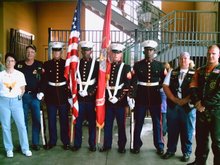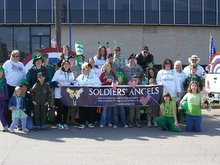This Weeks Soldier Was Suggested By Sunny Kay

68 years old from New York City, New York
16th Air Assault Brigade, Parachute Regiment (England)
Platoon Leader of 2nd Battalion, 7th Cavalry Regiment, 1st Cavalry Division (Airmobile) (U.S.)
September 11, 2001

Col. Rick Rescorla is a multiple time hero. In 1957 he enlisted in the British Army and began training as a paratrooper with The Parachute Regiment of the 16th Air Assault Brigade. He went on to serve with an intelligence unit in Cyprus, a paramilitary police inspector in the Northern Rhodesia Police (now the Zambia Police Service). When his military career ended in England he joined the Metropolitan Police Service in London. But he found the paperwork too boring and quite at the behest of a friend who encouraged him to join the United State Army. Which he did.
In 1963, Rescorla enlisted, with his friend, in the United States Army. After he completed basic training he attended officer training school and was assigned as a platoon leader in the 2nd Battalion, 7th Cavalry Regiment, 1st Cavalry Division (Airmobile).
He was shipped to Vietnam and participated in the Battle of la Drang. While in Vietnam, he was given the nickname "Hard Core" by his men for his bravery in battle.
In 1968, Resorla became a U.S. citizen and continued his service in the Army Reserves until 1990 when he retired. In 1985 he joined a financial services firm, located in the World Trade Center, as security director.
In 1993, when the WTC was bombed, Rescorla was instrumental in evacuating people from the building. Afterwards, he enacted a policy in which all employees of the firm practiced evacuation drills every three months.
September 11, 2001. Rick Rescorla was supposed to be on vacation getting ready for his daughters wedding. Instead he was at work covering a shift for one of his deputies so that he could go on vacation. When American Airlines Flight 11 hit Tower 1, Rescorla ignored officials advice to stay put and opted instead to put his evacuation drills to use. While evacuating the 3,800 employees of his firm in Towers 2 and 5 he kept reminding them "be proud to be an American ...everyone will be talking about you tomorrow" and sang God Bless America over his bullhorn. When Flight 175 struck Tower 2, Rescorla had already evacuated most of the employees from his firm as well as many others from other floors. He then went back in, despite being told he needed to evacuate himself. The last known words anyone heard him say were, "As soon as I make sure everyone else is out". Tower 2 collapsed with Rick Rescorla last seen heading to the 10th floor looking for more people to help.
As a result of his actions that day, all but six employees of his firm made it out alive. One of those being him and three others being his deputies who followed him into Tower 2, Wesley Mercer, Jorge Velazquez, and Godwin Forde.
These brave men and women sacrifice so much in their lives so that others may enjoy the freedoms we get to enjoy everyday. For that, I am proud to call them Hero.
We Should Not Only Mourn These Men And Women Who Died, We Should Also Thank God That Such People Lived
This post is part of the Wednesday Hero Blogroll. If you would like to participate in honoring the brave men and women who serve this great country, you can find out how by going here.
Heroism during Ramadi mission earns 1st, 149th Aviation pilots Distinguished Flying Cross
Low on fuel, taking fire and providing a vital communications link, the Apaches stayed long enough to allow the Humvee convoy to evacuate the wounded Soldiers before heading back to Camp Corregidor to refuel. While assessing battle damage, White and Moore discovered they had taken enemy fire to the aircraft’s tail wheel, belly and transmission. Salo and Stacy sustained damage to their helicopter’s flight systems. All four pilots could have determined that their aircraft were not safe to fly and headed back to LSA Anaconda, but they all decided to go back into the firefight and continue the mission.
“We knew the mission was vital and we had to go back in,” Salo said.
A "FOBBIT" is a slightly deragatory name for soldiers who do not go "outside the wire" (ie, generally remain on base). For the most part, while the army recognizes their endeavors with medals, they get little respect from their peers or recognition from the media for doing sometimes impossible tasks in tough conditions. Particularly, when those FOBs (forward operating bases) are in the middle of nowhere, far away from support, full of dust and mud and subject to mortar attacks. Yet, without them, the men who do go "outside the wire" couldn't function or do such a heroic deeds that are turned into movies of the week. So, here, we recognize the men and women who do the hard work in the shadows of giants on the battlefield.
Washington Air National Guard Bronze Star Recipients
The two airmen were deployed to Balad, Iraq, from March to September 2004 and were temporarily assigned to an Army transportation company, which turned out to be the first unit assigned to security convoys. The two quickly put skills they learned as civilians to use: Frady,
a systems administrator at a financial software company, set up the computer network for the camp; Stroisch, a sheriff’s deputy, created a training program to help new guardsmen become acquainted with the multiple duties they would be expected to perform.
Spc. Ashley Pullen from Raven 42
Then she heard a call for help over the radio. Pullen backed her Humvee into a better position, jumped out, and ran 90 meters through the line of fire toward the injured soldier. She administered first aid and tried to calm him down. As she was treating him, another soldier launched a shoulder-held rocket toward a nest of insurgents. Although he warned of the impending firing, Pullen couldn’t move out of the way fast enough. She threw her small frame over the wounded soldier to protect him from the blast – a blast that threw her off the soldier onto her backside.
She ran the length of a football field in full gear. She is 5'2". More on her return home.
Marine Corps Lance Cpl. Christopher S. Adlesperger: Navy Cross
As they entered the house, a volley of insurgent fire and grenades rained down upon them, immediately killing Adlesperger’s point man and injuring two others. Without pause, Adlesperger took control and moved out front, despite receiving minor wounds. As Adlesperger began firing back from the point position, he became the main target of enemy fire – but, with most of his squad pinned down by insurgent fire, he had no choice but to push forward on his own.
Adlesperger single-handedly cleared the stairs to the rooftop, which allowed the unit to move injured Marines upstairs to receive medical attention. And as U.S. forces gathered for a major assault on the building, Adlesperger, still inside, began moving from one spot to another, eliminating enemies in close quarters or forcing them to move out of entrenched positions to areas where U.S. forces were waiting.
Finally, an assault vehicle broke through a wall on the main floor. Adlesperger rejoined his platoon and demanded to take point for the final attack on the entrenched machine gun. He entered the courtyard first, and eliminated the final enemy at close range. By the end of the battle, Adlesperger was credited with having killed at least 11 insurgents.
The Citation
[snip]On his own initiative, while deliberately exposing himself to heavy enemy fire, he established a series of firing positions and attacked the enemy, forcing them to be destroyed in place or to move into an area where adjacent forces could engage them. Disregarding his own wounds and physical exhaustion, Private First Class Adlesperger rejoined his platoon and demanded to take point for a final assault on the same machine gun position.[snip]
Through his actions, Private First Class Adlesperger destroyed the last strongpoint in the Jolan District of Al Fallujah and saved the lives of his fellow Marines. By his outstanding display of decisive leadership, unlimited courage in the face of heavy enemy fire and utmost devotion to duty, Private First Class Adlesperger reflected great credit upon himself and upheld the highest traditions of the United States Marine Corps and the United States Naval Service.
Sadly, Cpl Addelsperger was killed a month later on a similar patrol.
His father speaks about how proud he is of his son.
According to the North County Times, Addelsperger was first nominated for the Medal of Honor.
Sgt York, upon being asked how he overcame such odds replied:
“There can be no doubt in the world of the fact of the divine power being in that. No other power under heaven could bring a man out of a place like that. Men were killed on both sides of me; and I was the biggest and the most exposed of all. Over thirty machine guns were maintaining rapid fire at me, point-blank from a range of about twenty-five yards. When you have God behind you, you can come out on top every time.”
God bless them, everyone! Please help Soldiers' Angels support our heroes.
 - May no soldier go unloved
- May no soldier go unloved


 Soldiers' Angels: Adopt a Soldier
Soldiers' Angels: Adopt a Soldier










